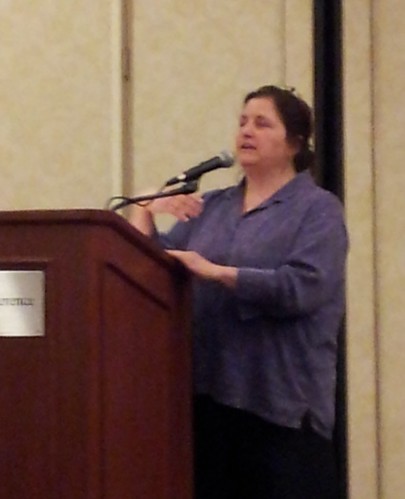Jane Brox at UMass Lowell

Dracut native Jane Brox, author of Brilliant: The Evolution of Artificial Light; Clearing Land; Five Thousand Days Like This One; and Here and Nowhere Else spoke at the UMass Lowell Inn and Conference Center yesterday as part of UML’s lunchtime lecture series. The topic of Brox’s talk was “Reading, Writing and Sense of Place.”
Brox said that a well-written book about a place she already knows “makes my old place seem new” but if the book is about a place she’s never been to, “it captures the spirit of the place for me.” Much historical writing uses what she called “a BBC voice”, something very formal and cold. She always searches for the “warmer voices of history” and cited Thoreau’s book about his journey on the Concord and Merrimack Rivers as an example. The lower Merrimack Valley is a great setting for books because it has “all the nation’s history concentrated in one place.”
Writing about place – in her case the family farm in Dracut – allowed Brox to preserve a thing she saw slipping away. She also talked on the nature of farming. Regarding the family farm, she said the American conception of a farm as “the stable icon of civilization” is “a ruse” because a farm must constantly change to survive. This idea that not only farms but the entire world changes at high speed was a recurring theme of her talk. She observed that today’s information age is really just a “hyped-up” industrial age and that the real disruption occurred nearly two centuries ago with the transition from agriculture to industrialization.
The power of disruptive change became a more personal topic during the question and answer period when Brox expressed, as someone who earns a living from writing books, some trepidation about the changing reading habits of the American population, changes conveyed by technology (e-readers), economics (demise of the bookstore) and personal habits (more distractions than ever). But despite all of these changes, Brox believes, as she stated earlier in the afternoon, that as our society becomes more and more mobile and transitory, that literature about place will become all the more important.